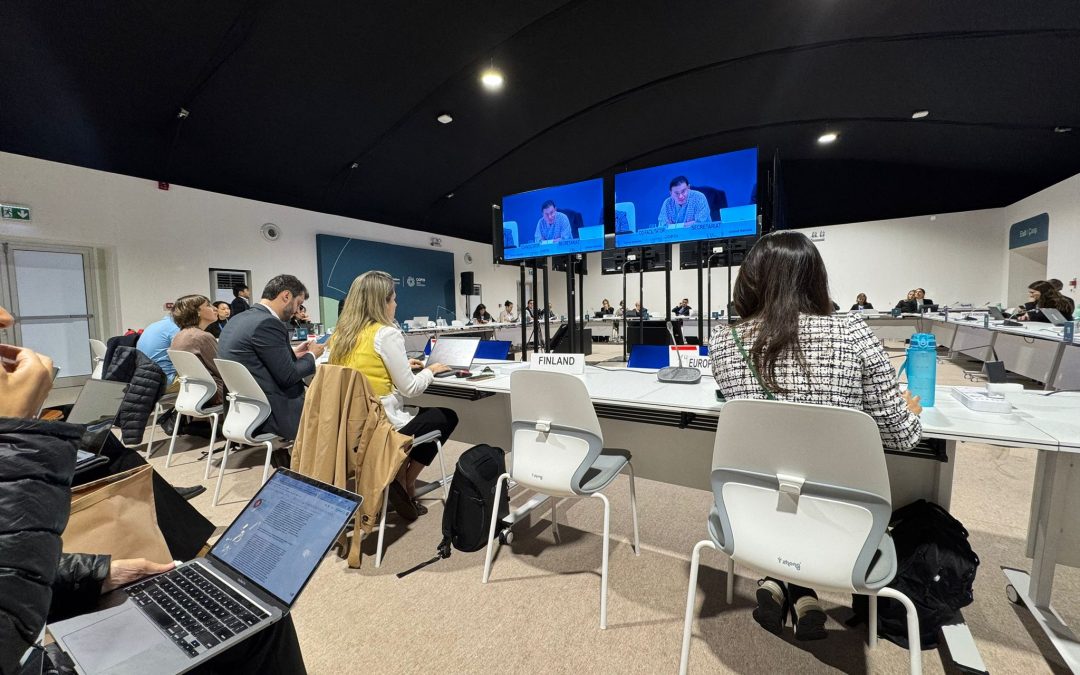Written by Naomi Paine, PhD student with Food Bio Systems DTP, University of Reading, UK.
Within its first few days, this COP has seen a major step forward in the development of a globally standardised carbon market, something that has long been awaited. The announcement has been met with a mixture of both enthusiasm and cynicism.
The agreement on Tuesday means there is finally international consensus on standards for carbon offset projects, something which has long been lacking in the voluntary carbon market. There has been cautious optimism that the agreement will support production of high-quality carbon credits, but there is fear that important elements have been rushed through. Carbon offsetting is a hugely divisive topic, with supporters believing it directs finance to underfunded carbon reduction projects, whilst critics say it is greenwashing at its worst, giving green credentials to environmentally worthless projects using inaccurate carbon capture measurements.
Trading carbon credits is not new- the world’s first carbon global fund, the ‘Prototype Carbon Fund’, was implemented by the World Bank in 1999. The concept is that instead of undertaking their own carbon reduction projects, companies (or countries) can choose to financially support carbon reduction initiatives happening elsewhere, thereby ‘offsetting’ their own emissions. By assigning a financial value to carbon removal projects, carbon markets encourage private sector funding in schemes that may otherwise struggle to succeed. But contention stems from known issues, such as projects overestimating the amount of carbon they claim to have sequestered or violent relocation of indigenous people on project land.[1] The carbon credits company Verra perfectly encapsulates the issue. Investors such as Disney and Gucci have invested in Verra’s forest conservation projects in Peru, but investigations appear to have uncovered that the threat of deforestation was disingenuously inflated in areas investors have paid to ‘protect’. Verra strenuously denies these claims and the dispute is ongoing.[2]
The decision reached by the parties at COP29 on the 12th was on the ‘Paris Agreement Crediting Mechanism’, which allows countries to trade reductions in carbon emissions. Following this COP, project developers will now be required to register their project with a UN supervisory body. This means there will finally be a global standardisation of carbon credits, inspiring trust in the market and thereby encouraging investment. The UN body will ensure projects adhere to certain environmental and human rights standards. John Kerry in his role as the chair of Energy Transition Acceleration has long been a proponent of a global carbon market, believing it is the only way to activate the finance required for a global green transition. Speaking of the $2 trillion often quoted as the amount needed to help the world stay below 1.5c warming, he said ‘No government has that money. But the private sector does. If we don’t mobilize the private sector, we do not win this battle. Simple.’[3] Mobilising the private sector into investing in an international plethora of UN verified carbon reduction projects could have a transformational impact on climate change.
But there was general dissatisfaction that this latest agreement was decided upon in an early plenary meeting without official observers and strategic groups. The lack of transparency leaves concerns that issues such as accountability of the credits and poor monitoring of environmental outcomes have not been satisfactorily resolved. There is also scepticism over the figure of $250billion- the amount quoted that carbon markets could raise annually for carbon reduction initiatives. This figure comes from a model created by the International Emissions Trading Association (IETA), a pro-carbon market group that counts ExxonMobil, Shell, and BP in its membership.[4] Although there is no suggestion of foul play on the part of IETA, there are understandable concerns over the motivations that some of their members may have in the implementation of a carbon market. Unquestionably, those who wish to continue burning fossil fuels whilst riding on ‘green’ credentials by using carbon offsetting schemes have a vested interest in the success of a global carbon market.
Carbon credit schemes have a real potential to energise the vital flow of private funding to where it can do the most good. Cynicism engendered by past failures should not be allowed to derail future progression in the sector. But though the potential is promising, COP29 must ensure rigorous oversight and accountability to avoid falling into the ever- present trap of greenwashing. Only then can this agreement truly support a green transition.
References:
Carbon Brief https://interactive.carbonbrief.org/carbon-offsets-2023/mapped.html
The Guardian www.theguardian.com/environment/2023/jan/18/revealed-forest-carbon-offsets-biggest-provider-worthless-verra-aoe
Global Change Institute on SABC News 13th November 2024
John Kerry, Chair of ETA ‘Accelerating Climate Action through High Integrity Carbon Markets’ Apr 2024
IETA https://www.ieta.org/memberships/#members
[1] https://interactive.carbonbrief.org/carbon-offsets-2023/mapped.html
[2] https://www.theguardian.com/environment/2023/jan/18/revealed-forest-carbon-offsets-biggest-provider-worthless-verra-aoe
[3] John Kerry, Chair of ETA ‘Accelerating Climate Action through High Integrity Carbon Markets’ Apr 2024
[4] https://www.ieta.org/memberships/#members


